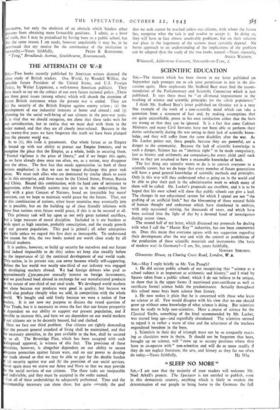SCIENTIFIC EDUCATION
Sig,—The interest which has been shown in my letter published on September 24th prompts me to ask your permission to join in the dis- cussion again. How unpleasant Mr. Stafford Beer must find the recom- mendation of the Parliamentary and Scientific Committee which is just published. It says there must be " an all-round improvement in the teaching of science and scientific principles for the whole population."
I think Mr. Stafford Beer's letter published on October 1st is a very fine example of the work of a non-scientific mind which can take a quotation from a statement of fact and, by making assumptions that are quite unjustifiable, prove to his own satisfaction either that the facts are wrong or that they can be ighored. It is a fact that some Cabinet Ministers and many Civil Servants have not been able to perform their duties satisfactorily during the war owing to their lack of scientific know- ledge, and they will suffer from the same disability after the war. As Mr. Locket points out, these people, because they arc powerful, are a danger to the community. Because the lack of scientific knowledge is such a danger, Science has an "intrinsic right" to be made compulsory, just as history and arithmetic are .compulsory. for every child until such time as they are assumed to have a reasonable knowledge of both.
The last thing any scientist wants to do is to convert everyone to a scientific career, but we do hope that every member of future generations will have a good general knowledge of scientific methods and principles. Only in this way will they understand what is going on in the world and be able to play their part in the administrative work to which many of them will be called. Mr. Locket's proposals are excellent, and it is to be hoped that his own school will show that public schools can give a lead. The changes in our educational system for which I appeal are not " the grafting of an artificial limb," but the blossoming of those natural fields of human thought and endeavour which have slumbered in embryo, with only occasional stirring, for thousands of Nears, and which have been assisted into the light of day by a devoted band of investigators during recent times.
The second half of my letter, which discussed my proposals for dealing with what I call the " Master Key "' industries, has not been commented on. Does this mean that everyone agrees with my suggestion regarding their development after the war and with the control or prohibition of the production of these scientific materials and instruments (the basis of modern war) in Germany?—I am, Sir, yours faithfully,


























 Previous page
Previous page